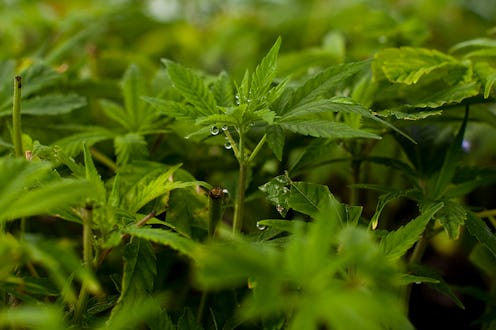Life
A Major New Study Linked Cannabis Use With Risk Of Psychosis — Here’s What To Know

If you’ve followed the news cycle at all within the past few years, you’ve probably noticed that talk of weed is everywhere. More and more states are legalizing marijuana, and cannabis plant derivatives like CBD and CBN are having a real moment in the wellness industry. But questions still remain about weed’s long term effects on regular users, with experts debating its benefits alongside cannabis' potential health risks. Marijuana’s relationship with psychosis, a condition where a person has trouble determining what’s real and what isn’t, and may experience symptoms like delusions and hallucinations, has long been a topic of interest for researchers. Adding to that body of research, a new European study found that daily cannabis use was strongly associated to a risk for developing psychosis, particularly among people who used high potency weed.
In a time where young Americans are increasingly choosing weed as their first drug of choice over alcohol or cigarettes, the new research is particularly relevant. Published in the journal The Lancet Psychiatry, the study focused on the link between cannabis use and rates of psychosis in the corresponding populations. The study analyzed data from participants aged 18 to 64 years old who had experienced a first episode of psychosis, as well as controls who represented their local populations. Participants were sourced from 11 cities throughout Europe, including London, Amsterdam, and Paris, and Brazil.
The researchers looked at which patterns of cannabis use carried the highest odds for psychotic disorder in individuals, and separated cannabis use into two groups: low potency and high potency of the substance. High potency cannabis was defined by the researchers as products with greater than 10 percent THC, the substance responsible for pot's psychoactive effects. The patient group reported more commonly used high potency cannabis, relative to the control group. Additionally, roughly 30 percent of patients with first episode psychosis reported daily use of cannabis, compared to about 7 percent of control participants. Across all cities, the data indicated that daily cannabis users were three times more likely to have a psychotic episode, relative to people who’d never used it. For high potency users, the risk was five times more likely for a psychotic episode diagnosis.
The relationship between psychosis and cannabis use was notably most significant in Amsterdam and London, where the study noted, “high potency cannabis is commonly available.” In London, roughly 30 percent of new cases were estimated to be associated with high potency usage, while researchers estimated that half of new psychosis cases in Amsterdam were linked with high potency use. Across all the cities, the researchers estimated that one in five new cases of psychosis might be associated with daily cannabis use, with one in ten cases related to high potency cannabis use.
"Our findings are consistent with previous studies showing that the use of cannabis with a high concentration of THC has more harmful effects on mental health than the use of weaker forms,” said Dr. Marta Di Forti, one of the study authors, in a statement. “They also indicate for the first time how cannabis use affects the incidence of psychotic disorder at a population level."
While the study indicates a significant relationship between weed usage and psychosis, it doesn’t imply direct causation. Factors like genetics and an individual’s environment also play a major role in mental health, and as Dr. Diana Martinez, a psychiatrist and addiction researcher at Columbia University, told NPR: "You can't say that cannabis causes psychosis. It's simply not supported by the data."
However, the results do present a strong case for a better understanding of how new cannabis legislation might affect public health in the long run. "As the legal status of cannabis changes in many countries and states, and as we consider the medicinal properties of some types of cannabis,” Dr. Di Forti said in the statement, “it is of vital public health importance that we also consider the potential adverse effects that are associated with daily cannabis use, especially high potency varieties.”